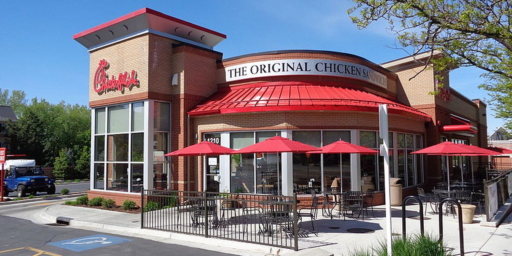Globalism Killed Localism (But Gave Us the World)
 Daniel Larison argues, quite persuasively, that free trade comes at the expense of local flavor. In continental countries like the United States, this is a domestic phenomenon as well as an international one.
Daniel Larison argues, quite persuasively, that free trade comes at the expense of local flavor. In continental countries like the United States, this is a domestic phenomenon as well as an international one.
If regional differences remain in the U.S., they are much less pronounced today than ever before thanks to a combination of mass mobility, technological advance facilitating rapid transport and communication across the continent and shared consumer culture. Minnesotans may not eat fatback and Vermonters may not eat rellenos, but everyone is importing the same pork from the same factory farms in the Midwest, and perhaps the less said about the homogenizing effects of the national Buffalo wing phenomenon the better. We are steadily moving towards the economic, cultural and political monoculture that [Mark] Thompson claims we are avoiding.
Cultural homogenization on one level has advanced rapidly as transplants relocate from place to place, the highway system has reduced barriers of time and space between different parts of the country and television and radio have steadily eradicated distinctive accents in mass communication, which gradually eliminates them from everyday life as well. At the same time, there has also been fragmentation and dispersion as people have tended towards identifying with others who have similar lifestyles and tastes, so that they can pretend that they belong to non-localized “communities” while becoming steadily more alienated from their actual neighbors. Considering this, Charles Murray’s assumption that the institution of community is somehow being kept “robust and vital” in the current American model is questionable.
I can’t argue with any of this. Indeed, while I’m not the citizen of the world that Barack Obama is, I’ve experienced most of this firsthand. Growing up in an Army family and then serving as an Army officer and then an academic gypsy, I’ve lived in multiple countries and at least seven states. Heck, my infant daughter had, by the time she was two months old, been in Virginia, DC, Maryland, New Jersey, Pennsylvania, Deleware, New Jersey, New York, and Connecticut. We’re taking her to Mexico via Texas in May.
While they of course retain distinct local flavors, it’s amazing how similar the major metropolitan areas are. One will encounter many of the same chain stores in New York, London, Milan, Paris, and Cairo. And the downtown areas of most American midsize towns will have the same strip malls and chain restaurants. To be sure, there’s still plenty of local flavor. But not as much as there was when I was a kid, let alone when my parents were kids.
Something has undoubtedly been lost as a result. But let’s not discount the gains. The homogeneity that people complain about means that small town Mississippi now has many of the advantages that were, even twenty years ago, available only in the big cities. Sure, there are better options in most big cities than Starbucks, Samuel Adams, Ben & Jerry’s, and Olive Garden. But they’re a damned site better than Maxwell House, Budweiser, Blue Bunny, and Pizza Inn. And let’s not forget the wonder of an Amazon Prime membership, which will allow someone on Paducah, Kentucky to get pretty much anything they want delivered to their door in two days with no shipping costs.
That we’ve become relatively disconnected from our neighbors is without question a bad thing and one imagines our frequent moves and the ability to disconnect from our local reality by plugging in to various faraway virtual realities contribute something to that. Then again, sociologists have been lamenting this trend since the 1920s so perhaps not so large a role as one might think.
Photo by Flickr user drl, used under Creative Commons license.




![Alabama Utility Crews Turned Away From Sandy Relief: Not Union [UPDATE: Not Exactly]](https://otb.cachefly.net/wp-content/uploads/2018/03/natural-disaster-tornado-volcano-fire-hurricane-earthquake-886x464-512x256.jpg)
I believe some of Krugman’s academic work showed that diversity can still increase under these conditions. Instead of Country 1 having restaurants a,b,c, and Country 2 having d,e,f, now both countries have a,b,e,f.
That’s right, intuitively. But that means you get a,b,e,f everywhere and c and d nowhere. A lot of restaurants aren’t scalable or cater to local tastes for which there’s not a market elsewhere. Then again, the vast majority of them simply suck so much that people would prefer Olive Garden or PF Chang’s.
Capitalism destroys…and creates anew…and destroys…and creates anew…and for the most part, we’re the better for it. Schumpeter called it “creative destruction”. But you know, our life is a life of loss: loves, friends, family, youth, health. And capitalism really hasn’t got a lot to do with that home truth. Thomas Wolfe encapsulated our situation perfectly: You Can’t Go Home Again.
Those who pine for this localism never lived in that world. They don’t have memories of the excitement when Walden’s Books opened bringing so many different topics. Or the tasty treat of the first Taco Bell burrito (I know), which was so exotic. Or the sad fact that if Sears didn’t have it, you couldn’t have it.
Now the world can come to your door. Tasty Thai food is available in where only meat and potatoes were before. If it exists, UPS will bring it to you at a good price and you now know Taco Bell and Mexican food are two different things entirely. We now can enjoy an endless variety of different tasting beers and coffees.
Sure localism has died but it was only exciting to those who visited, for the locals it was bland even if they didn’t know it. The real local flavors thrive you just have to look a bit harder to find them. How do you keep them on the farm when they’ve experienced the big city?
I have to disagree with this a little bit. Instead of a,b,e,f, one ends up with a+1/2, b-1/5, e-2/3, f+1/4 everywhere, because of markets of scale (easier to make it the same everywhere, meaning the lowest common denominator) In my area of the Ozarks, we have a # of Mexican restaurants (with Mexicans running them) but I still cannot get true mexican food (it is good, just not true Mexican). Some years ago I used to go to a soul food place on the near south side of St Louis (“Mamma Jamma’s”) but they are closed (or moved) now… Hard to find good soul food nowadays (I got my my eye on a place, “Sweetie Pies”, I hear nothing but good about it but haven’t yet made it there), and good “Southern Cooking” gets harder to find all the time (I spend more than a little time below the Mason Dixon)
JJ: where you going in Mexico? I can send you to some eye-popping places (that you and yours would love) in the state of SLP, if you like. Contact me off blog (I assume you can get my e-mail) if you are interested.
JKB: Agreed, but as noted above,
It is only something resembling tasty Thai food, and to find that one has to go to Thailand, and leave the beaten tourist tracks.
Something is gained, yes, but something is also lost. It is why I surf the web for recipes.
I know some people from Asian countries who argue that their national cuisines are better in California. You can go to good restaurants (in immigrant community strip-malls) and they’ll have access to better ingredients here.
I was slow to accept this, but as the only white guy at the table, it kind of seemed silly to be the hold-out.
I can still go to some cities in the south and get some really good barbeque that is locally made and unique to that region.
there is a place here in NH that sells some of that local flavor barbeque from NC-the owner is a transplant from NC and opened their own shop.
I am not sure that globalization has removed all things local, I just think it has removed some things local that global can do better.
If in your searches you find an acceptable menudo recipe, tom p., send it to me, Janis Gore, if you will. I’m at gonesouth.blogspot.com.
Now that I have localized into rural Louisiana from Dallas, I have a surfeit of good Louisiana food, but the Mexican food leaves something to be desired. And I miss Indian no end.
I couldn’t live long in this community without the Internet.
I have mixed feelings about which kind of world is better. I think a big factor is how much traveling one does. I think the more travelling you do, the more you want an abc/def world. The less traveling you do, the better the abef world is for you. I can afford to do very little traveling at the moment, so having Starbucks and El Potro down the street are a major improvement to this redneck town.
tom p,
My mistake. I should have said Tasty “Thai” food to acknowledge that while you can now get new flavors in new places, it is only a facsimile of that available from the the home area or where there is an active immigrant community. Still it beats the same ole localized food of yore where the fare was only what local people grew up with.
But local isn’t gone it has just been refined. You have to look and be adventurous. But if you just fly in, you’re probably going to end up at the non-local chain unless you have a local guide to tell you where the good places are. Since the best place are usually hidden away in the declining business area and not the shiny new shopping area.
I think what Mr. Larison is lamenting more, though, is the loss of productive work that sustains and informs robust local cultures and small towns.
When a sugar mill that employs six hundred closes in South Louisiana, that community is desolate and must quickly empty. The institutions that grew around individuals — the child carers and the schoolteachers as examples, the pastors and the coaches — are weakened and possibly gone.
It’s a profoundly conservative viewpoint that has good points.
I’d add that the South has benefited from homogenization to the extent that racism has been mitigated.
And for Lord’s sake, don’t forget the hairdressers and barbers.
But it’s interesting to note that where this has been happening in the most pronounced way, is in the cities, not in rural America. Certainly, the communications age has given rise to the misanthrope. But are Urban Americans isolating themselves online because they can, or are they retreating into the online world as a defensive action? Doesn’t take much in the way of newscasts for Joe Lunchpail to figure out there are a number of people within rifle range that he’s better off not knowing, and staying the hell away from. Having lived in the city for a few years, I know this stuff first hand.
Meanwhile, folks in Rural America tend to need that retreat online less… possibly because of the quality of people there, vs what you’ll find in the city, possibly because there’s a higher level of physical isolation, possibly a combo of both.
Yeah. If Atlanta politics, which I loosely follow, is of any indication, the hatred s not limited to one race or another. They’ve graduation to full fledged misanthropy. They hate EVERYONE now, based on the additonal exposure. I’m not quite sure I’d conclude that a net positive.